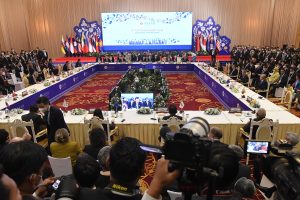ASEAN leaders held their annual summits in Phnom Penh this weekend, alongside prime ministers and presidents from another dozen or so nations – the first such in-person event since the COVID-19 pandemic erupted more than two years ago.
As expected, there was no shortage of back-slapping and press releases extolling the virtues of the “ASEAN Way” dished out to about 1,500 media people who had converged on the Sokha Hotel on the tip of the Chroy Chongva peninsula, where the Tonle Sap meets the Mekong River.
More than 12,000 security personnel and a fleet of military helicopters were deployed for the summits which also served as a prelude to this week’s Group of 20 (G-20) meeting in Bali and the Asia-Pacific Economic Cooperation (APEC) summit in Bangkok.
VIP spotting has proved popular among the locals, made all the more easier by absent-minded diplomats who toured the seedy streets of the capital’s nightlife districts with their national flags flying proudly from the bonnets of their limousines.
U.S. President Joe Biden was also a touch absent-minded, either slipping or going Freudian by mistakenly referring to the host country Cambodia as Colombia. Cambodian Prime Minister Hun Sen, this year’s chair, didn’t seem to mind.
But the business end of the summits – the ASEAN and East Asia summits, and the meetings between ASEAN and its various Dialogue Partners – was hectic, as big ticket items overshadowed issues like climate change, global inflation, supply chains and even the perennial hot-button issue, the South China Sea.
In fact, 70 “outcomes documents and declarations” were signed off on “to advance and deepen relations,” Hun Sen said.
China put its Belt and Road Initiative (BRI) back on the ASEAN agenda, after a three-year pandemic-induced hiatus, by signing off on contracts covering an extensive network of road and bridge construction, including a $1.6 billion expressway linking Phnom Penh with Vietnam.
Timor-Leste was granted “in-principle” admission to the bloc, 11 years after it applied, providing a victory of sorts for Hun Sen, who had promised to steer the tiny Catholic country into ASEAN this year. Full admission, as the eleventh member, now seems likely in 2023.
Myanmar and its junta, banned from attending, again dominated proceedings, and they were most upset after ASEAN leaders produced a review that left open the option of negotiations with the opposition and a much harsher stand now that Indonesia has assumed the chair for 2023.
Ukraine was a scene-stealer, signing off on the Instrument of Accession to the Treaty on Amity and Cooperation in Southeast Asia. The beleaguered country is one step away from becoming a full dialogue partner, which would put it on par with the likes of Australia, Japan, the U.S., and Russia.
Russian President Vladimir Putin was a no-show for the East Asia Summit and that added some grit as Ukraine’s foreign minister urged Southeast Asian countries to take all measures possible to stop Russia from playing “hunger games” over getting Ukrainian grain to markets.
Throughout, Cambodia – which has spent much of the past three years locking-up political dissidents – provided the stage and a charming face that papered over the deep divisions within ASEAN and the broader Indo-Pacific front.
The West wants ASEAN to play a central role as the Quad – Australia, India, Japan, and the U.S. – moves increasingly to counter Chinese influence in the Indo-Pacific, described by Biden “as the biggest issue of our time.” “We will build an Indo-Pacific that’s free and open, stable and prosperous, and resilient and secure,” he added.
But the underlying subtext of the summit was that many Southeast Asia states are torn, and that they don’t want to choose.
It’s a weak defense that can only work if China reins in its aggressive economic and military expansion in the South China Sea and the Indian and Pacific oceans, and it’s the key issue that will persist when this caravan of political leaders heads to Bali, and then Bangkok, later this week.

































